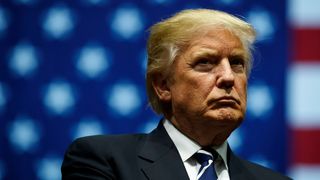On 14 August former president Trump was indicted on 13 counts by a Georgia grand jury, along with several of his top allies, as part of a sweeping investigation into their alleged efforts to overturn the 2020 election results. Trump has pled not guilty to all 13 charges and made history with his already infamous mug shot, all while the 2024 presidential race picks up steam and his GOP rivals gathered for the first Republican debate of the primary election cycle.
United States Studies Centre Non-Resident Senior Fellow Bruce Wolpe discusses what this unprecedented fourth indictment means for Trump’s presidential campaign and the implications for US allies like Australia.
Bruce, this is now the fourth set of criminal charges facing former president Trump. What distinguishes the Georgia case from Trump’s previous indictments?
The Georgia indictments brought by Fani Willis, the Fulton County prosecutor, are distinct from the other principal criminal charges that have been brought against former president Donald Trump over his handling of classified documents and his alleged attempts to overturn the 2020 election certification in the Congress on 6 January 2021.
First, the Georgia case is extraordinarily wide-ranging. Eighteen other individuals were indicted with Trump for criminally interfering with the certification of the vote in Georgia in November 2020, and in the appointment of electors to cast Georgia’s vote in the Electoral College.
Second, the indictment not only outlines specific criminal activities allegedly undertaken to overturn Georgia’s vote, such as the infamous phone call during which Trump asked Georgia’s Secretary of State to “find 11,780 votes” to enable Trump to carry the state, but Willis is pressing racketeering charges as well. She is citing a web of actions undertaken as part of a criminal conspiracy to overturn the vote in Georgia. The legal standard of proof for this class of alleged wrongdoing is less strict than what is required to prove specific criminal activity. The Georgia case, in other words, is treating Trump and the 18 others charged as acting like mobsters who engage in organised crime.
Third, as this is a state criminal proceeding, there is no opportunity for any president to pardon Trump or any others charged in Georgia; the presidential pardon power only applies to federal crimes. With so many people involved, this is a very complex case legally and procedurally. It will likely take far longer to conclude than Trump’s other major criminal cases.
Much has been made of the tangled timeline ahead, as Trump’s mounting legal troubles play out alongside a packed political calendar in the lead-up to the 2024 presidential election. Do these trials pose a real threat to Trump’s bid for the Republican nomination?
So far, the answer to that question has been a resounding “no” from Republican voters. The latest Wall Street Journal poll at the weekend showed that Trump is the “top choice” of a massive 59 per cent of Republican voters nationally, while all of his opponents are in the single digits, bar only Ron DeSantis as the first choice of 13 per cent of Republican voters. In other words, Trump does not have any major opponent as of right now. Polling experts cannot recall a candidate with such a measure of support at this stage in the campaign failing to win their party’s nomination.
That said, Trump really must show decisive strength in the first two primary states, Iowa and New Hampshire, by winning those primaries. Polling in those states shows Trump with a very strong lead, but smaller than the national trend. If DeSantis—who has funding support of nearly US$100 million—or someone else from the field comes very close to Trump in those two early states, that could change the dynamic of the subsequent contests. This is why Iowa, especially, is so important.
Some believe that, at some point, Trump’s legal problems will overwhelm his political standing among Republicans. Yet the fact is, if you overlay his legal calendar with the Republican primary calendar, the lion’s share of delegates to the Republican convention will be decided by early May 2024. It is highly unlikely that any of the major criminal trials will be concluded, with a verdict, by early May. In other words, it is highly unlikely that Trump will be facing Republican primary voters as a convicted felon.
Your recently released book Trump’s Australia contemplates what a second Trump presidential term would mean for Australia and its ties with the United States. Do these indictments change what you wrote about in the book and, if so, how?
Trump left office extremely angry. He believes that he won the 2020 election. That it was stolen. That he is being persecuted by a Justice Department and FBI that have been weaponised by the Democrats to take him down by removing him as a contender through these indictments, and that these criminal charges constitute the greatest case of political interference in an election in the country’s history. To an even greater degree today—than even on the day he was forced to leave the White House—Trump wants vengeance against those who he sees as trying to take him down. If he returns to power, he will exact his vengeance against his enemies without mercy. That was my judgment in the book, and my perspective has not changed.
USSC Insights is curated by Research Associate Ava Kalinauskas.






